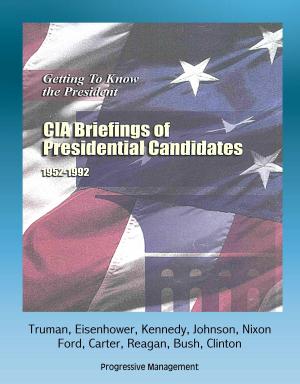Military Professionalism and Political Influence: A Case Study of the Mexican Military, 1917-1940 - Pancho Villa, Mexican Revolution, Carranza, Obregon, Calles, Cardenas Years, Latin America
Nonfiction, History, Americas, Mexico, Military, Strategy| Author: | Progressive Management | ISBN: | 9781310388590 |
| Publisher: | Progressive Management | Publication: | July 9, 2016 |
| Imprint: | Smashwords Edition | Language: | English |
| Author: | Progressive Management |
| ISBN: | 9781310388590 |
| Publisher: | Progressive Management |
| Publication: | July 9, 2016 |
| Imprint: | Smashwords Edition |
| Language: | English |
This excellent report has been professionally converted for accurate flowing-text e-book format reproduction. This study will explore the relationship between military professionalism and military political influence. While many scholars believe that increased military professionalism will "depoliticize" the armed forces, others argue that professionalization encourages the military to assume an active and even dominant role in politics. Thus, within the context of these two opposing theories, this thesis will analyze the process of professionalization that the Mexican military experienced during the years 1917-1940, and the role it played in limiting the political influence of the Mexican military.
Most scholars who study Latin America have concluded that military professionalism has led to a highly politicized military that exercises a strong, if not dominating, influence in the government. Thus, Mexico is an extremely interesting case to examine, not only because it is one of the few nations in Latin America that has enjoyed a prolonged period of stable civil-military relations, but also because professionalization of the military occurred during the same era as the loss of political influence. Given the traditionally strong political role of Latin American militaries, it is only natural to question why the Mexican military has not conformed to this pattern.
There were several characteristics unique to the professionalization of the Mexican military that were largely responsible for the decline of its political influence. Key among these unique characteristics was the incorporation of a revolutionary ideology into the professionalization process that successfully equated loyalty to the principles of the Mexican Revolution with loyalty to the national government. In addition, Mexico's leaders sought to preserve this revolutionary ideology by maintaining strict national control over the professionalization process. Also unique was the strategy to gradually professionalize the Mexican military by creating a corps of young professional officers who would eventually inherit control of the military from those generals who were veterans of the Mexican Revolution. Finally, it was crucial that the professionalization of the military did not occur by itself, but concurrent with the development of a strong political party.
CHAPTER 1 - INTRODUCTION * Problem Statement * Significance * Objectives/Expected Results * Methodology * Theoretical Concepts * Structure * CHAPTER 2 - REVIEW OF THE LITERATURE * Introduction * Professionalism Lessens Political Influence: General Theory * Professionalism Increases Political Influence: General Theory * Professionalism Lessens Political Influence: Latin America * Professionalism Increases Political Influence: Latin America * Current State of the Literature: The Call for Re-Professionalization * Conclusion * CHAPTER 3 - POLITICAL INFLUENCE OF THE MEXICAN MILITARY * Introduction * The Military of the Mexican Revolution, 1910-1917 * The Process of Presidential Succession, 1917-1940 * The Military in Government * The Military Budget * Military Strength * Military Zones * Conclusion * CHAPTER 4 - PROFESSIONALIZATION OF THE MEXICAN MILITARY * Introduction * The Carranza Years, 1917-1920 * The Obregon Years, 1920-1924 * The Calles Years, 1924-1934 * The Cardenas Years, 1934-1940 * Conclusion * CHAPTER 5 - AN ANALYSIS OF MILITARY PROFESSIONALISM * Introduction * The Degree of Professionalism * Professionalization of the Mexican Military: Unique Aspects * Mexico's "Revolutionary" Professionalism * National Control of Professionalism * Professionalism for Junior Officers * Military Professionalization and Civilian Organization * Other Contributing Factors * Creation of a Political Party * Agrarian and Labor Militias * Economic Growth * Conclusion * CHAPTER 6 - CONCLUSION
This excellent report has been professionally converted for accurate flowing-text e-book format reproduction. This study will explore the relationship between military professionalism and military political influence. While many scholars believe that increased military professionalism will "depoliticize" the armed forces, others argue that professionalization encourages the military to assume an active and even dominant role in politics. Thus, within the context of these two opposing theories, this thesis will analyze the process of professionalization that the Mexican military experienced during the years 1917-1940, and the role it played in limiting the political influence of the Mexican military.
Most scholars who study Latin America have concluded that military professionalism has led to a highly politicized military that exercises a strong, if not dominating, influence in the government. Thus, Mexico is an extremely interesting case to examine, not only because it is one of the few nations in Latin America that has enjoyed a prolonged period of stable civil-military relations, but also because professionalization of the military occurred during the same era as the loss of political influence. Given the traditionally strong political role of Latin American militaries, it is only natural to question why the Mexican military has not conformed to this pattern.
There were several characteristics unique to the professionalization of the Mexican military that were largely responsible for the decline of its political influence. Key among these unique characteristics was the incorporation of a revolutionary ideology into the professionalization process that successfully equated loyalty to the principles of the Mexican Revolution with loyalty to the national government. In addition, Mexico's leaders sought to preserve this revolutionary ideology by maintaining strict national control over the professionalization process. Also unique was the strategy to gradually professionalize the Mexican military by creating a corps of young professional officers who would eventually inherit control of the military from those generals who were veterans of the Mexican Revolution. Finally, it was crucial that the professionalization of the military did not occur by itself, but concurrent with the development of a strong political party.
CHAPTER 1 - INTRODUCTION * Problem Statement * Significance * Objectives/Expected Results * Methodology * Theoretical Concepts * Structure * CHAPTER 2 - REVIEW OF THE LITERATURE * Introduction * Professionalism Lessens Political Influence: General Theory * Professionalism Increases Political Influence: General Theory * Professionalism Lessens Political Influence: Latin America * Professionalism Increases Political Influence: Latin America * Current State of the Literature: The Call for Re-Professionalization * Conclusion * CHAPTER 3 - POLITICAL INFLUENCE OF THE MEXICAN MILITARY * Introduction * The Military of the Mexican Revolution, 1910-1917 * The Process of Presidential Succession, 1917-1940 * The Military in Government * The Military Budget * Military Strength * Military Zones * Conclusion * CHAPTER 4 - PROFESSIONALIZATION OF THE MEXICAN MILITARY * Introduction * The Carranza Years, 1917-1920 * The Obregon Years, 1920-1924 * The Calles Years, 1924-1934 * The Cardenas Years, 1934-1940 * Conclusion * CHAPTER 5 - AN ANALYSIS OF MILITARY PROFESSIONALISM * Introduction * The Degree of Professionalism * Professionalization of the Mexican Military: Unique Aspects * Mexico's "Revolutionary" Professionalism * National Control of Professionalism * Professionalism for Junior Officers * Military Professionalization and Civilian Organization * Other Contributing Factors * Creation of a Political Party * Agrarian and Labor Militias * Economic Growth * Conclusion * CHAPTER 6 - CONCLUSION















